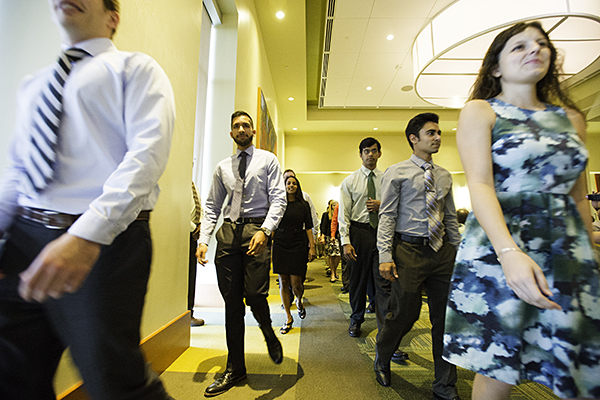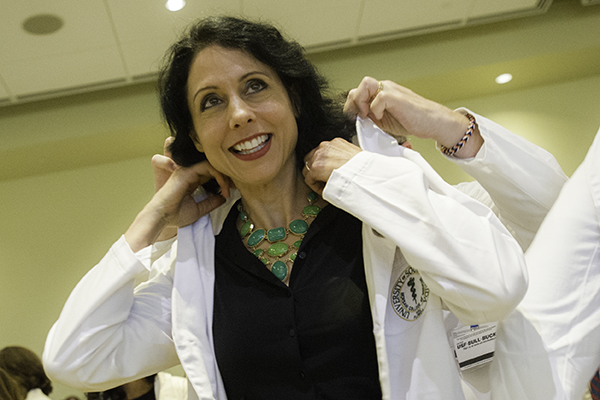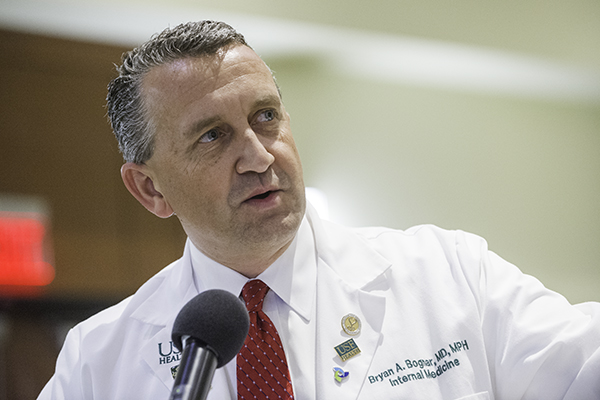
Charles Lockwood, MD, senior vice president of USF Health and dean of the Morsani College of Medicine, with several members of the MCOM Class of 2019.
The 179 new University of South Florida medical students who donned their first white coats Friday evening are part of a class that has already broken records.
- The USF Health Morsani College of Medicine Class of 2019, the largest in the college’s history, was the most selective class ever. The new students were chosen from among a record number of 5,235 applicants – up 24 percent from last year. In addition, secondary applications, were up 30 percent from the year earlier.
- The students garnered among the top scores in the nation on their MCAT exams, the standardized test for the study of medicine. The average MCAT score for the newly admitted students was 32.59 –up 7 percent over last year and the highest in the state of Florida. That would place USF in the 90th percentile for all students taking the exam nationwide.
- The new students will benefit from a record in student scholarship funds contributed by 192 donors, including 72 USF M.D alumni. MCOM donors raised more than $94,000 for the White Coat Scholarship fund so far this year — a 78.5 percent increase over last year. Of that total, $80,000 will be used to create scholarships for the MCOM Class of 2019.

Students file into the Marshall Center Ballroom to begin the White Coat Ceremony that marks their entry into the profession of medicine.
Before turning his attention to students seated on the stage for the White Coat Ceremony, Charles Lockwood, MD, senior vice president for USF Health and dean of the Morsani College of Medicine, recognized special guests Carol and Frank Morsani, thanked donors, and welcomed the audience of faculty, staff, alumni and students’ families and friends who packed the Marshall Center Ballroom for the annual rite of passage
“We are delighted to have assembled an extraordinary group of compassionate and brilliant future doctors,” Dr. Lockwood said.
“This an amazing time to be a physician. We are all on a journey toward a very different and very much better health care system,” he said. “Wearing the white coat is an incredible privilege – but it comes with great responsibilities. It signifies that you pledge to strive for excellence in everything you do for your patients, to ensure that their needs will be at the center of all you do.
“Earning the trust and respect of your patients is the key determinant of your future success as a physician… I know I can count of each one of you to build trust with your patients and deliver high value care. I welcome you as you take this important step on your journey to becoming a doctor. I cannot wait to see what the future of medicine will be in your hands.”

“I know I can count on each one of your to build trust with your patients and deliver high value care,” Dr. Lockwood said in his address to the new medical students.
Neil Manimala, president of the MCOM Student Council, spoke about humanism in medicine from a student’s perspective.
“Humanism is at its very essence, love for your fellow man, woman and child. Please know that I don’t wear rose-colored glasses and think of the world as kumbaya fantasy. I know that love is sacrificing part of yourself,” said Manimala, a fourth-year student. “Do not try to shield yourself from the pain that love may bring by putting up barriers. Do not try to compartmentalize who you are… Remember, Class of 2019, to treat strangers like loved ones — and don’t get so carried away in yourself that you treat loved ones like strangers.”
Manimala shared the story of how a health scare involving his younger brother helped him take that message to heart. When the once inseparable youngsters grew up and went their separate ways – one to college in Tallahassee and another to start medical school at USF – they did not keep in touch much.

Neil Manimala, president of the MCOM Student Council, spoke about humanism in medicine from a student’s perspective.
When Manimala received texts from his brother saying that he was always tired, that he could not run as far as he once could without getting short of breath, and finally that his legs had swollen with fluid, the busy medical student brushed off the information. When a concerned family friend listened to his younger brother’s heart, a murmur was discovered and further testing revealed Manimala’s brother had contracted a virus that infected his heart, leaving it functioning 20 percent less than normal. After receiving massive doses of medications typically reserved for patients in heart failure, Manimala’s brother, while still recovering, is fine today.
“I had just been studying a chapter on cardiovascular disease, yet I couldn’t take the time to listen to his symptoms… and give true meaning to all I had learned,” Manimala said. “It’s easy to compartmentalize who you are, but doing so contradicts sincere humanism.”
Dennis Ledford, MD, the Ellsworth and Mabel Simmons Professor of Allergy and Immunology and recipient of the 2015 Leonard Tow Humanism in Medicine Award, spoke about the significance of the white coat.

Faculty member Dennis Ledford, MD, recipient of the 2015 Leonard Tow Humanism in Medicine Award, spoke about the symbolic significance of the white coat.
“I view the white coat as a powerful placebo,” Dr. Ledford said. “This in no way diminishes the white coat, but convinces me that there are therapeutic effects in just putting on this coat. A patient’s perception, faith, trust and expectation influences the clinical outcome, and the white coat conveys trust, altruism, skill, knowledge – providing a symbolic placebo.
“No matter how effective your treatment, no matter how insightful your clinical diagnosis, the symbolic power of the white coat and the communication of caring will add to your treatment or add to your perceptive clinical thinking.
“Can we be doctors in blue pajamas and tennis shoes?… Yes, but the communication of caring will be more difficult, will take more time and require extra finesse,” Dr. Ledford said. “Medicine is a blessed responsibility given to us, not because we deserve such a responsibility, because we are capable, available and stand ready to care and to wear a white coat.”
After receiving their new white coats, members of the MCOM Class of 2019 recited the Oath of Commitment – a promise to serve their patients well – led by Bryan Bognar, MD, MPH, vice dean for MCOM Educational Affairs.
Among the new USF medical students embarking on the lifelong journey of learning that a career in medicine embodies:
— Nathaniel Baker, who spent five years in the U.S. Army following after graduation from Rockford University in Illinois, was injured by shrapnel from a rocket-propelled grenade during a deployment to Afghanistan as an infantryman. Baker said his experiences as a patient, who recovered from multiple surgeries on his wounded thigh and repeated infections, provided valuable insight on the health care system and how physicians can impact patient healing.
— Catherine Divingian, who holds a PhD in health psychology, worked as a medical physicist in the U.S. Navy, a professor of sciences, and a nutritionist and personal trainer before entering medical school. She hopes to return to the Navy to serve military patients after becoming a physician.
— Luis Espinosa of Gainesville, FL, the first in his family to graduate from college, overcame several obstacles to successfully compete for a slot in medical school 11 years after earning his G.E.D. A turning point that jumpstarted his pursuit of becoming a doctor, Espinosa said, was the summer he volunteered as a counselor at a medically-supervised camp for children diagnosed with sickle cell anemia.
— Gilbert Murimwa, born in Zimbabwe, Africa, earned a master’s degree in medical sciences from USF. His goal – to become an oncologist specializing in interventional radiology – was inspired by observing the medical team that cared for his high school football coach. “He was a young guy who didn’t smoke or drink,” Murimwa said, but died a month after being diagnosed with late-stage esophageal cancer.
— Johanna Yun majored in anthropology and biology as an undergraduate at the University of Louisville, receiving both a Brown Fellow scholarship and a Fulbright scholarship. She studied political science in China, conducted social research for a non-governmental organization in Nepal, worked at a pediatric ward in Cochabamba, Bolivia, and taught high school conversational English in Korea. Yun is interested in pursuing a surgical specialty.

The student processional was led into the ballroom with bagpipe music played by Gregory Nicolosi, PhD, associate professor emeritus of Molecular Pharmacology and Physiology.

The White Coat Ceremony was attended by two of the USF medical school and university’s friends and most passionate advocates Carol and Frank Morsani.

Family members and friends clamored to get photos as students received their white coats from MCOM faculty members.

Students recite their Oath of Commitment in unison, pledging to bring honor and integrity to the “privileged profession of medicine.”
Photos by Eric Younghans, USF Health Communications







